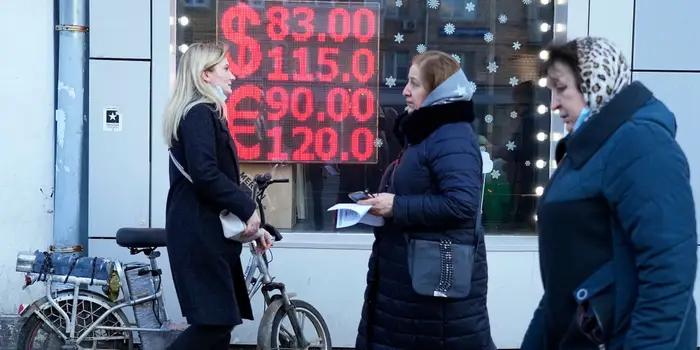
PARIS, March 3 (NNN-AGENCIES) — From closed airspace to frozen assets, Western countries have announced increasingly severe economic sanctions against Vladimir Putin, his relatives and inner circle — and on the Russian economy.
FINANCIAL SECTOR: More than any other area, the West has targeted the financial sector to limit Russia’s capacity to fund the war.
In a major blow to the Russian financial system, the European Union on Wednesday cut seven Russian banks from the SWIFT messaging system, which allows banks to communicate rapidly and securely about transactions.
Concerned by sanctions, Russia’s largest lender Sberbank said on Wednesday it was leaving the European market.
The bloc also barred new EU investment in the Russian Direct Investment Fund (RDIF) in a similar move to London which had added the fund to its list of sanctioned Russian entities.
The United States and the EU had gone even further by directly targeting Russia’s central bank, with a ban as of Monday on all transactions with the bank.
The sanction effectively freezes the assets held by the central bank in the US, limiting its ability to use its large foreign exchange reserves to buy rubles and support the value of its currency. Canada and Japan have announced a similar ban.
The sanctions on the Russian financial sector are already being felt. Notably, there has been a dramatic fall in the value of the ruble, which has forced the Russian central bank to almost double its key interest rate.
US credit card giants Visa, Mastercard and American Express also said they were blocking Russian banks from their payment networks.
TRANSPORTATION: The airline sector was one of the first to be affected by the economic fallout from the Ukrainian conflict. Russian carrier Aeroflot was banned from the airspace of the entire EU, the United Kingdom and Canada, forcing it to suspend flights to these destinations. In retaliation, Russia has banned airlines from those same countries from flying over its territory.
The entire Russian aviation industry has been targeted. The EU and Canada have banned the export of aircraft, parts and equipment from the aviation and space industries to Russia.
Nor has maritime transport been spared. Britain has closed all its ports to ships flying the Russian flag and those chartered or owned by Russians. Last Saturday, France intercepted a Russian cargo ship belonging to PSB bank, which was targeted by European sanctions.
Finally, Swedish auto and truck manufacturer Volvo Group announced on Monday it would suspend deliveries to Russia and halt production at its Russian factory.
The three biggest container shipping groups in the world, Danish giant Maersk, Switzerland-based MSC and France’s CMA CGM, and other smaller competitors announced on Tuesday they were suspending non-essential deliveries to Russia.
ENERGY: The most symbolic decision in this key sector came from Germany. Berlin last Tuesday halted the certification process for the Nord Stream 2 gas pipeline, a key conduit designed to increase deliveries of Russian gas to Germany.
Russian gas giant Gazprom has been blocked from raising funds on Western financial markets.
Directly attacking the Russian energy sector is more complicated for Westerners, however, especially for Europeans. Russia is the world’s largest producer of gas and second-largest producer of oil, and several European countries, including Germany and Italy, are heavily dependent on Russian hydrocarbon imports.
INDUSTRIAL GOODS: Last Friday, Japan announced sanctions on the export of semiconductors and other items to “Russian military-related organisations”, without providing further details. This is an important step: Japan, along with South Korea and Taiwan, is one of the main producers of these electronic components, which are essential for a wide range of industrial products.
The US had announced restrictions on Russia’s use of its technologies in various fields, including processors and chips manufactured by top suppliers Nvidia, Intel and Qualcomm.
European countries are considering similar sanctions. This would block Russian access to Britain’s ARM, which dominates the European market for semiconductor architecture, a key element in the production of processors.
MEDIA: The EU on Wednesday banned Kremlin-controlled media outlets RT and Sputnik from broadcasting into the bloc via satellite, cable, apps or the internet.
It also suspended their licences in the EU, specifically also targeting RT’s subsidiaries broadcasting in English, German, French and Spanish.
PUBLIC FIGURES: Several Russian figures were targeted by European and US sanctions following Russia’s annexation of Crimea in 2014. The list has now been expanded to include more Russian decision-makers. Chief among them are
Prime Minister Mikhail Mishustin, Foreign Minister Sergei Lavrov and President Vladimir Putin himself. — NNN-AGENCIES









